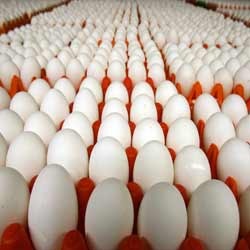 Namakkal, September 22: Oman has lifted the ban on import of eggs from India, an association of poultry and livestock farmers here said on Friday.
Namakkal, September 22: Oman has lifted the ban on import of eggs from India, an association of poultry and livestock farmers here said on Friday.
The first consignment of eggs from India to Oman would be despatched on Monday.
The ban was imposed in the last week of March following reports of bird flu in the northern States, Secretary of the Livestock and Agri Farmers Trade Association (LIFT), P.V. Senthil, who is also a poultry farmer and exporter, told The Hindu.
Poultry industry sources said that Namakkal accounted for nearly 95 per cent of the egg export from India, as eggs produced in this region had a competitive edge over the produce in other zones. The eggs had dark yellow yolk, delivery time was less due to easy accessibility to ports and the price was competitive.
This industry in the second largest egg production centre in India suffered a setback when there was a bird flu outbreak in north India earlier this year.
Oman banned the import of eggs from India on March 27 based on the OIE (World Organisation for Animal Health) norms following bird flu outbreak in Orissa.
Oman accounts for 33 per cent of the total egg export from India. Egg exports, which stood at 557.34 lakh eggs in March, dropped to 415.64 lakh in April, a month after the ban was imposed by Oman. It dropped to 240.88 lakh eggs in May and touched a 10-year-low monthly export of 89.74 lakh eggs in June.
The ban is lifted only three months after the OIE declares a country free from bird flu.
Dr. Senthil said that the first order came from traders in Oman on Thursday after the OIE declared India as a country that was free from bird flu on Saturday (September 15).
On an average, one container with 4.72 lakh eggs would be exported every day from Monday, taking the monthly average to 141.6 more eggs (about 30 containers in a month). This would benefit many poultry farmers of this region. Export to Oman was expected to go past 210 lakh eggs a month during the Christmas season.
Poultry farmers and exporters thanked the Animal Husbandry Department and the Commerce Ministry for taking efforts to lift the ban.
LIFT urged the Centre to initiate steps for resuming exports to the United Arab Emirates, Kuwait, Iraq and Qatar. These countries were importing eggs from India five years ago.
Statistics from the National Egg Coordination Committee (NECC), Namakkal zone, reveal that overall exports have been increasing over the last two months. From just 89.74 lakh eggs exported in June, it increased to 136.97 lakh eggs in July and 212.54 lakh eggs in August.
Chairman of the NECC Namakkal zone P. Selvaraj said that the demand for egg had increased in Afghanistan – a top destination for India – after the summer came to an end in that country a few weeks ago. “More countries are evincing interest in importing eggs from India and we expect exports to increase steadily”, he added.





Comments
Add new comment